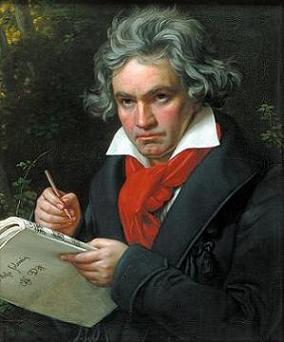Review: Beethoven Festival's Opening Night
By Alexander Hough in Arts & Entertainment on Jun 3, 2010 9:00PM

Portrait of Beethoven by Joseph Karl Stieler
The brilliance of Ludwig van Beethoven's music is due to how revolutionary it was, almost single-handedly towing Western music from the Classical to Romantic eras, while also standing the test of time - at this point it's probably safe to say it'll be played for as long as this civilization lasts. While he produced monoliths in many settings - his string quartets, piano concertos, and piano sonatas, to name a few - it's his nine symphonies that form that spine of his oeuvre, and which will, appropriately, be the centerpiece of the festival.
The flagship of last night's opening program was the Fifth Symphony in C minor, the beginning of which contains probably the most famous eight notes in Western music. That's not hyperbole; on the off chance you don't already know what notes we're talking about, listen here for a few seconds. What's less well known is that those notes are just the opening to a tormented eight-minute first movement, and the material forms the thematic current throughout the thirty-minute symphony. In last night's performance, Haitink chose to emphasize the tumult, already present in gobs in the score, by giving a decidedly, if not overt, Romantic interpretation.
This decision, with the gentle ebb and flow of tempo and full-throated sound, was almost unsettling after a first half consisting of pristine readings of the "Fidelio" Overture and the Eighth Symphony, works that are more Classical in nature despite being written after the Fifth (which premiered in 1808). Haitink clearly wanted a different sound for the more dramatic Fifth - there were even more strings on stage to augment the additional brass and woodwinds scored by Beethoven - although the shift in focus cost the orchestra in terms of precision and rhythmic emphasis.
This criticism is part personal preference, but rhythmic figures play a vital role in the Fifth. That set of notes is tempo-less at the beginning, but they become a syncopated figure that propels the piece forward. May the music gods forgive us, but think of Walter Murphy, who used that figure to put the boogie in cocaine-fueled disco dancers. There's an urgent quality in those notes, and that restlessness recurs throughout the symphony. Here are a handful of examples:
- First movement - shortly after the famous intro, the figure is passed around the whole orchestra (clip duration: 25 seconds)
- First movement - a tutti passage with variations on the syncopation (clip duration: 10 seconds)
- Second movement - the figure, played by the second violins, is used to create tension under the sweet melody at the 2'54" mark (clip duration: 20 seconds)
- Third movement - the horn call echoes the figure (clip duration: 5 seconds)
- Third movement - the timpani solo that connects the third and fourth movements (clip duration: to the end)
- Fourth movement - the figure is morphed into triplets (clip duration: 20 seconds)
This thematic material was by no means lost, but Hatink and the CSO ceded a bit here in exchange for a more wildly emotional ride. At its worst, some of the musical layers were muddied. This approach brought its share of bright moments, too, underscored by the oboe cadenza that brings the first movement to a momentary halt, which principal oboist Eugene Izotov beautifully drew out, dying away to almost nothing to perfectly connect with the violins' piano entrance. In any case, by the time the third movement began, the performance had evened out a bit, although not at the expense of providing an exciting end to the piece.
It's worth mentioning how fortunate Chicagoans are to have an orchestra the caliber of the CSO. We've mentioned before how exciting it is to hear them play the ultra-dynamic works of the late Romantic period - Mahler, Strauss, and the like - which made it all the more remarkable to experience the immaculately balanced Classical sound of the concert's first half. From the standpoint of pure orchestral sound, "Fidelio" and the Eighth were last night's standouts.
While we'd love to urge you to check out tonight's repeat performance, the concert is unfortunately sold out. Fortunately, some of the remaining concerts still have tickets available, so swing by the CSO's website as soon as possible to get tickets to the Second and Third (June 8), Fourth and Sixth (June 10-11), First and Seventh (June 15-16), and the Ninth (June 18-20). Or check out one of the free concerts. Go here for the full schedule of events, or here if you prefer brochures.